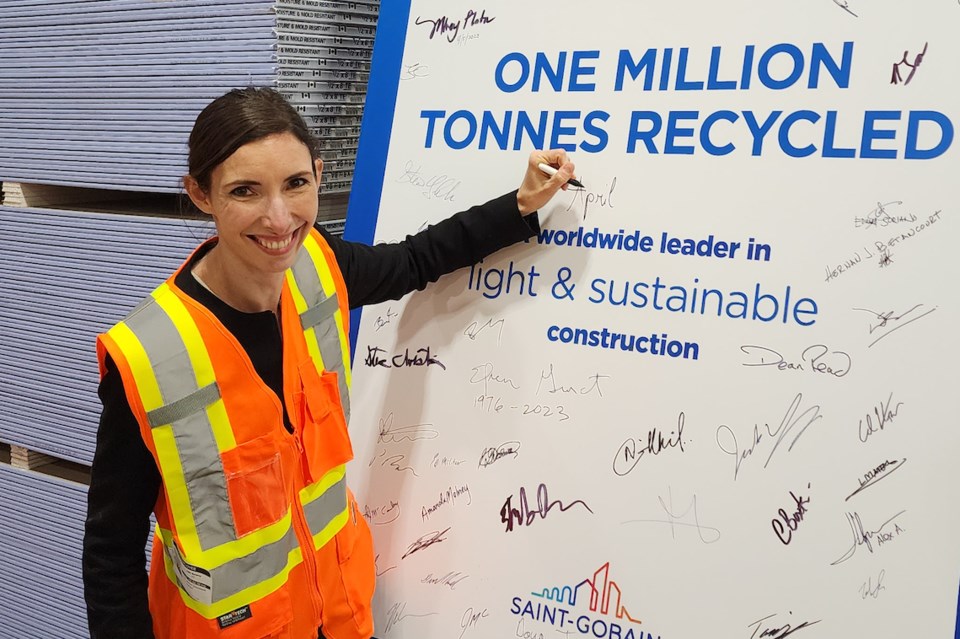While the construction sector seeks to green its operations by embracing electrification and reducing greenhouse gas emissions, a significant shift is also underway among the leaders charged with making the transition happen.
With diversity, equity and inclusion infusing new breath into the push for leaders more reflective of society at large, women are increasingly at the forefront of the generational changes unfolding at all levels of their companies.
Historically, the construction sector has been male-dominated, and the same is true of companies supplying building materials such as glass, insulation and wallboard.
“[Manufacturing] is an industry where you have around 30 per cent women when it would be 47 per cent in the workforce in general,” said Julie Bonamy Racine, CEO of CertainTeed Canada Inc., a division of French glass and building materials supplier Saint-Gobain S.A.
Based in Mississauga, CertainTeed Canada has 15 locations in Canada, including Montreal, Winnipeg, Calgary and Delta manufacturing gypsum, insulation, ceiling and finishing products. It also has gypsum mining operations.
CertainTeed has long been a leading supplier of wallboard to the construction sector in Western Canada and has embraced recycling and other practices designed to reduce the impact of its operations on the environment.
CertainTeed appointed Racine to lead its operations in Canada in 2022, its first female CEO in North America. She succeeded Richard Juggery, who became CEO of Saint-Gobain Benelux after four years with CertainTeed.
“Saint-Gobain is very engaged in diversity,” she said, comparing her career path favourably to her six years in the public sector, where she served as an adviser to the Office of the French Minister for the Economy on the budget and digital sector prior to joining Saint-Gobain in 2017.
Previously, she had held a similar role as CEO for Saint-Gobain Malaysia, Singapore and Indonesia, noting that Saint-Gobain has been keen to invest in female talent.
“My management team was 50 per cent female, which was great,” she said.
When she left, the region was divided in two, each headed by female CEOs from Racine’s management team.
“They demonstrated that they had all of the skills and experience to replace me,” she said.
The promotions also Illustrated the potential for women to advance in the company, though Racine says it’s not always easy and has to respect local dynamics. In Canada, for example, she works with CertainTeed’s human resources department to identify roadblocks, strategies for removing them and opportunities to assist women already in the company to grow and advance.
“You have to manage your HR policies and approach in a way that’s meaningful for women, and it’s not the same if you’re in Singapore, if you’re in Indonesia, if you’re in Canada, because the expectations for women are not the same,” she said.
However, if companies don’t provide opportunities and ensure equitable access, advancement won’t happen even at all.
“It’s important to communicate in our industry and showcase that we are a good place to work, that we are a good company, that we empower women, and you can have a great career,” she said. “We also have to offer attractive positions, because everyone wants to attract women, so we have to be the best to attract and retain them.”
Being the best also extends to social causes, such as environmental stewardship. Prior to Racine-Bonamy joining CertainTeed, initiatives were underway to transition its Montreal plant to hydro power, a project that will complete in 2025. This will make it the company’s first plant outside Europe to electrify.
In Western Canada, its wallboard plant in Delta recently installed a dry heat recovery system that will reduce greenhouse gas emissions by up to 15 per cent from 2017 levels. This supports a company-wide initiative to reduce emissions 30 per cent by 2030 and achieve carbon-neutral status by 2050.
“If you want to be carbon neutral by 2050, you have to start investing very early on.”
“The investments we make today, that’s going to be our CO2 emissions in 2050.”
Canada is an ideal location because of the unique combination of clean electricity in BC, Manitoba and Quebec; carbon taxes, which help make the projects economical; and government support for businesses to green their operations and embrace carbon neutrality.
Working in partnership with New West Gypsum Recycling, CertainTeed’s Delta plant is also producing panels made with 20 per cent recycled gypsum.
“In the gypsum industry, being 20% recycled is a real achievement. There are very few plants in the world that can achieve this level,” Racine says.
The payoff isn’t just in reduced emissions and a cleaner environment. The recycled panels also support efforts to bring more homes to market faster. In April 2023, the Delta facility marked recovery of a million tonnes of gypsum, enough to build 250,000 homes.
“There is a huge need for housing in Canada and seeing good gypsum go to landfill when you could reuse it build houses for Canadians just doesn’t make sense,” Racine said. “B.C. is very, very advanced. You can’t landfill gypsum in B.C., which is very helpful. We hope it will spread to other provinces.”





